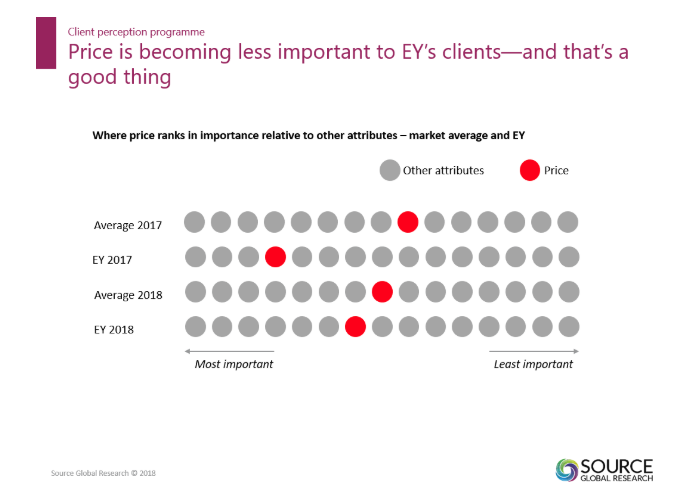EY: Building a better consulting brandThursday 10th May, 2018By Alison Huntington. EY has this week been crowned as the most powerful brand in the UK in a study by Brand Finance. It’s beaten the likes of Rolls Royce, Magnum, and Costa coffee to the top spot, gaining an AAA+ brand rating based on measurements such as marketing investment, financial performance, and “emotional connection”. But, as I’ve taken to pointing out quite a lot recently, I’m not sure how much this helps leaders understand their brand—particularly in multidisciplinary firms like EY. Is it EY’s audit brand that’s strong, or all parts of its business? Do people have more of an “emotional connection” with EY than they do with their cup of Costa coffee? Does it matter? There’s no doubt that EY has been bold in its brand investment recently. It’s “building a better working world” slogan emblazons airport lounges and billboards, putting the firm’s purpose front and centre, and creates a shared goal for both employee and client. So what impact has it had on clients’ perceptions of its consulting business? For many years, we had seen a curious pattern repeat itself when clients told us about EY. They’d be lukewarm about the quality of its work—a higher proportion would rate the firm “average” than they would for other firms. But, the firm was frequently deemed to be ahead of its competitors when it came to the critical question of whether it delivered value, relative to the fees it charges. This pattern occurred for about three years, and tended to remain even when we cut our data by geography or industry. We also noticed that EY’s clients tended to say prices were much more important to them than clients of other firms did. From this we concluded that clients were so positive about value because the firm was either cheaper than others—thus lowering the bar to adding value—or discounting heavily in bulk deals. Either way, value and price point were firmly connected in EY’s clients’ minds, while other firms had succeeded in creating a link between value and other things—expertise, strategic partnership, the impact of their work, and so on. The good news for EY is that this seems to be changing. In our latest research, perceptions about the quality of its work have improved. The proportion of clients that say the firm adds value has stayed about the same, but crucially, they say price is far less important to them. In other words, they’re judging the value the firm adds more on the work it delivers than the fees it charges. While I remain sceptical that EY’s leaders will find it useful knowing whether or not their brand makes more or less of an “emotional connection” with the average British punter than Eva Longoria pouting at a Magnum ice cream, our global data certainly points to a consulting brand that has strengthened considerably. For more information on the work we do in client and brand insights, click here. *A note on methodology: Every year we survey senior end-users of consulting services, asking them to tell us their perceptions of the world’s leading consulting firms. The data in this blog is based on our survey of 3,197 clients in November and December 2017. We ask each to tell us about three consulting firms of their choosing, giving us 9,591 responses in total. 461 are about EY. Blog categories: |



Add new comment